
Vasiliki Papathanasiou, generally known as Vicky Leandros, is a Greek singer living in Germany. She is the daughter of singer, musician and composer Leandros Papathanasiou. In 1967, she achieved worldwide fame after gaining fourth place for the country of Luxembourg in the Eurovision Song Contest with the song "L'amour est bleu", which became a worldwide hit. She further established her career by winning the Eurovision Song Contest in 1972 with the song "Après Toi", again representing Luxembourg.
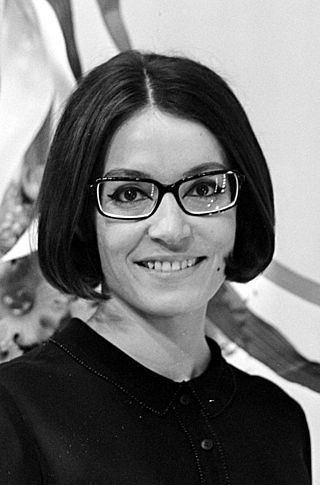
Ioanna "Nana" Mouskouri is a Greek singer and politician. Over the span of her career, she has released over 200 albums in at least thirteen languages, including Greek, French, English, German, Dutch, Portuguese, Italian, Japanese, Spanish, Hebrew, Welsh, Mandarin Chinese and Corsican.
"Salma Ya Salama" is a song by Dalida from 1976, based on the original 1918 song by Sayed Darwish. The track became one of the singer's biggest hits and a remix, released in 1997, was certified silver in France.

Natasha St-Pier is a Canadian singer and songwriter of Acadian origin. She has spent most of her career in France, and represented France in the 2001 Eurovision Song Contest with the song "Je n'ai que mon âme".

Jean-Pierre Danel is a French guitarist, record producer, music writer, and songwriter. Jean-Pierre Danel has recorded a large number of guitar albums as well as guitar teaching materials. In 2006, his album Guitar Connection, released by Sony BMG, was certified gold in France, followed by several other records certified gold or platinum.
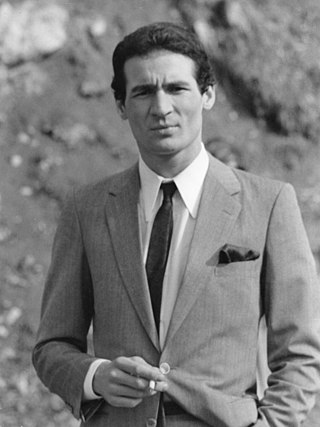
Jean-Jacques Pascal, known professionally as Pascal Danel, was a French pop singer and composer.

Lucien Voulzy, better known as Laurent Voulzy, is a French singer-songwriter, composer and musician.
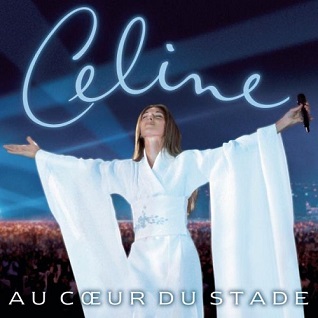
Au cœur du stade is the fourth live album by Canadian singer Celine Dion, released by Sony Music on 27 August 1999. It was recorded during two sold-out concerts at the Stade de France in Paris in June 1999. Dion made music history with these two concerts, becoming the first artist in history to perform for more than 90,000 spectators, with a grand total of 180,000 ticketholders over the two nights. The album features primarily French-language songs, mainly from S'il suffisait d'aimer (1998), but also includes "My Heart Will Go On" and "Let's Talk About Love". Au cœur du stade topped the charts in Francophone countries and was certified double platinum in France, platinum in Belgium and Switzerland, and gold in Canada.
"Lara's Theme" is the name given to a leitmotif written for the 1965 film Doctor Zhivago by composer Maurice Jarre. Soon afterward, the leitmotif became the basis of the song "Somewhere, My Love". Numerous versions, both orchestral and vocal, have been recorded, among the most popular was the version by Ray Conniff Singers.

The discography of German electronic band Kraftwerk consists of 10 studio albums, two live albums, one remix album and 26 singles. Formed by Ralf Hütter and Florian Schneider in Düsseldorf in 1970, Kraftwerk were part of the krautrock scene. However, the group mostly found fame as pioneers of electronic music, showcasing their styles on a series of concept albums.
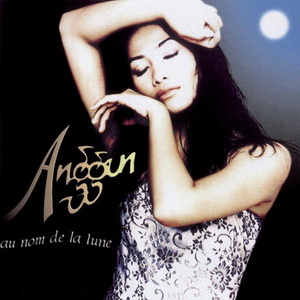
Snow on the Sahara / Au nom de la lune is the fifth studio album and first international release by Indonesian singer Anggun. The French version was first released in France on 24 June 1997 by Columbia Records, while the English version was later released internationally by major label Sony Music Entertainment in 33 countries throughout Asia, Europe, and America between late 1997 to early 1999. Having various editions with different track listing and artwork, the album was also marketed as Anggun's self-titled album in several countries, such as Indonesia and Japan. The album was a huge artistic departure to Anggun's earlier rock style, experimenting with world music sounds.
Mount Kilimanjaro is a volcano in Tanzania and the highest mountain in Africa.
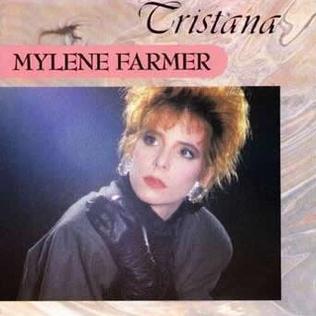
"Tristana" is a 1987 song recorded by the French artist Mylène Farmer. Fourth single from her first studio album Cendres de Lune, the song was released in February 1987. As for the previous single "Libertine", the music video was produced as a film, with many extras and a huge budget. The second single in Farmer's career with lyrics entirely written by the singer herself, it enjoyed an intense promotion on television and met a great success in France, reaching the top ten.

"Jour de neige" is a 1988 song recorded by French singer Elsa Lunghini. Written by Pierre Grosz with a music composed by Vincent-Marie Bouvot and Georges Lunghini, it was released in November 1988 as the third single from her debut album Elsa. As for the previous three singles, it had a great success in France, reaching number two. Two years later, it was released in Italy and Spain in the languages of these countries.
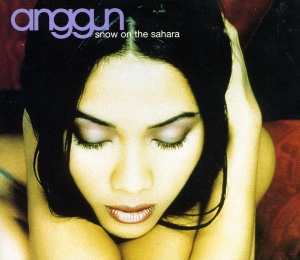
"Snow on the Sahara" is a song by Indonesian singer Anggun from her first international studio album Snow on the Sahara. Written originally in French by Erick Benzi titled "La neige au Sahara", the song was adapted to English by Nikki Matheson. The French version was recorded for Anggun's first French album Au nom de la lune. The song was released in 1997 as her debut international single in 33 countries worldwide. It topped the charts in Italy, Spain and several countries in Asia. The French version quickly became a hit in France, peaking at number 1 on the French Airplay Chart and number 16 on the French Singles Chart. It became the most-played single in France in 1997, with a total of 7,900 radio airplays, and was certified gold for shipment of 250,000 copies. While in Italy, it sold 100,000 copies.

The repertoire of the Italian-French singer Dalida includes no less than 700 songs that have led her to record in 11 languages.

The Snows of Kilimanjaro is a 2011 French drama film directed by Robert Guédiguian. It premiered in the Un Certain Regard section at the 2011 Cannes Film Festival. It won the audience award and the Silver Spike at the Valladolid International Film Festival.

Nena were a West German Neue Deutsche Welle band formed in West Berlin in 1981. In 1983 and 1984, their German-language song "99 Luftballons" reached number one in the singles charts of countries around the world.
The Snows of Kilimanjaro may refer to:
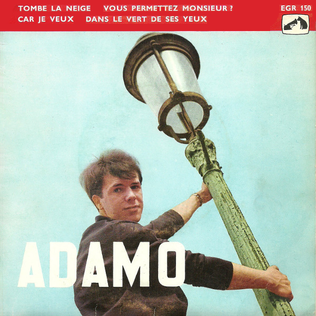
"Tombe la neige" is a French language song written and sung by Belgian-Italian singer Salvatore Adamo. The song was released in 1963 and became an international hit and one of his best-known songs.














